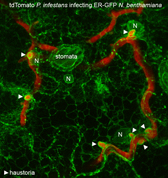Hosts and models
The Solanaceae are a large family of flowering plants that includes a number of agriculturally important crops such as Solanum (potato, tomato, eggplant), Capsicum (paprika, chili pepper), Physalis peruviana (Cape gooseberry) and Nicotiana (tobacco). The members of the Solanaceae family that are of most interest for examining the interactions with pests and diseases at The James Hutton Institute are potato, tomato, pepper and tobacco. Although genome sequences and well established transformation protocols are available, these large crop plants can be too recalcitrant for many cellular and molecular experiments that involve transient assays.

Nicotiana benthamiana is a close relative of tobacco and is used by a growing scientific community as a model organism for performing plant research in relation to Solanaceae and is an excellent target plant for defence related studies. At The James Hutton Institute we routinely use N. benthamiana for gene silencing and agroinfiltration experiments.
Effector-target bioassays
A key focus for our work is the functional characterisation of effectors and their role in suppression of host defences. We use assays for PTI and ETI and examine the roles of host proteins in these responses using techniques such as VIGS.
